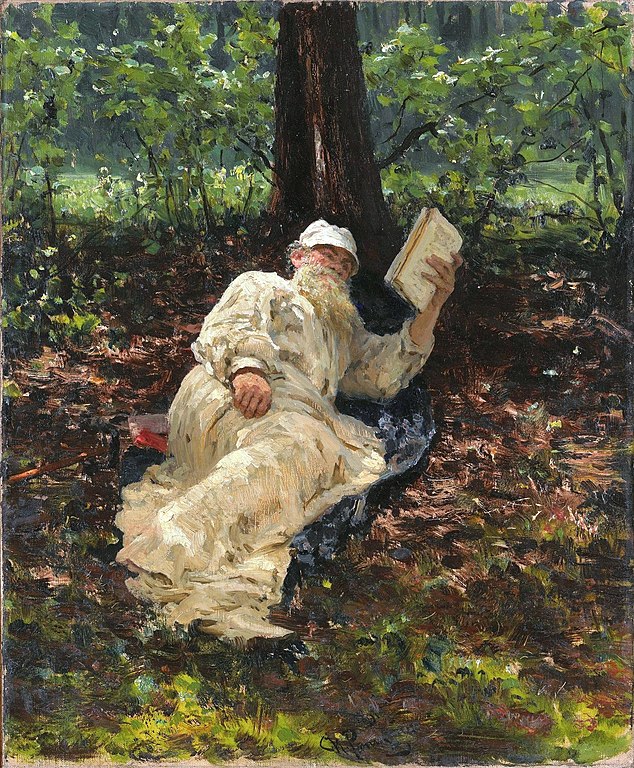Leo Tolstoy Archive
Written: 1862
Source: From RevoltLib.com
Transcription/Markup: Andy Carloff
Online Source: RevoltLib.com; 2021

The school is free, and at first the pupils came only from the village of Yasnaya Poly ana. Many of these scholars left school because their parents did not consider the teaching good; many after they had learned to read and write ceased coming, and took service at the post-station, for that was the chief industry of our village.
Some came at first from the poor villages of the neighborhood, but on account of the inconvenience of getting back and forth, or the expense of meals which cost at the very least not less than two silver rubles a month, they were soon withdrawn.
Well-to-do muzhiks from more distant villages were attracted by the gratuitous instruction afforded, and by the report spread abroad among the people that there was good teaching at the Y. P. school, and sent us their children; but this winter with the opening of the village schools they withdrew them again and placed them in the village schools, where a price was charged.
There remained in the Y. P. school the children of the Yasnopolyansky peasants, who go in the winter time, and in summer from April to the middle of October work in the fields, and the children of peasant farmers, overseers, soldiers, domestic servants, tavern-keepers, sacristans, and rich muzhiks, who come from a radius of thirty or fifty versts around.
The total number of pupils reaches forty, but rarely more than thirty are present together. Of girls there are three or five from six to ten per cent. The ages of the boys are generally between seven and thirteen when the school is of normal size.
Moreover, every year there are three or four adults who come for a month or even for all winter, and then leave entirely. For these adults who come to school individually the school method is very trying, for by reason of their age and their sense of dignity they are prevented from taking part in the life of the school, and they cannot help feeling scorn for the children, and so they remain perfectly isolated. The animation of the school only confuses them. They come for the most to finish their studies, having already had some little instruction, and persuaded in their own minds that study is merely the perusal of some book about which they have heard, or which they have in times past had some little experience of.
In order to come to school the adult must surmount his timidity and shyness, and endure the family storm and the ridicule of his comrades:
"Oh, would you see, the old nag has come to school!"
And then, besides, he has the constant feeling that every day wasted in school is a day lost for his work, which constitutes his only capital, and therefore all the time he is in school he finds himself in a state of nervous excitement and haste which is most injurious for his studies.
At the time which I am writing about there were three such adults in the school, and one of them still continues to come.
The adults act in school just as if they were at a fire; the instant one has finished writing he instantly lays the pen down, and while he is doing so, he grasps a book with his other hand, and begins to read standing; as soon as you take a book from him he grabs his slate; and when you take that from him he is entirely lost.
We had this autumn a laboring man who took care of the stoves and studied at the same time. In two weeks he learned to read and write, but this was not study: it was an illness, a fit of intoxication! As he would go carrying a load of wood through the class-room, he would stop, and with the wood in his arms would bend down over a lad's head, and, spelling s-k-a, ska, would go to his place.
When he failed to do that, then he would look at the children with envy, almost with anger. When he was at liberty, then there was no restraining him; he would devour his book, repeating b-a, ba, r-i, ri, and so on, and when he was in this condition he was deprived of all power of comprehending anything else.
When the adults had to sing or draw or hear a story from history or watch experiments, then it was evident that they yielded to a cruel necessity, and, like the famished when torn from their food, they only waited eagerly the moment when they could betake themselves to their a b c book. Remaining faithful to my principle, I never compelled the boy to learn the alphabet when he did not want to, or the adult to learn physics or drawing when he preferred the alphabet. Each selected what he wanted.
As a rule such adults as had studied before have not as yet found their place in the Y. P. school, and their learning goes hard; there is something unnatural and painful in their relations to the school. The Sundayschools which I have seen present the same phenomena as regards adults, and therefore all data about the successful voluntary instruction of adults would be for us most useful and valuable.